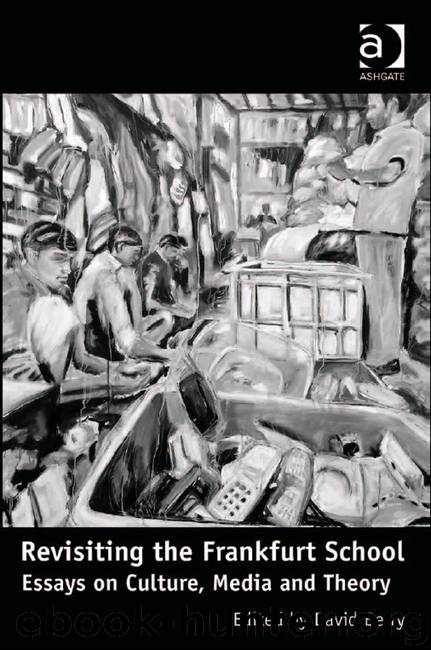Revisiting the Frankfurt School by Berry David Dr

Author:Berry, David, Dr
Language: eng
Format: epub
Publisher: Ashgate Publishing Ltd
Published: 2011-03-14T16:00:00+00:00
Smythe’s ‘Consciousness Industry’
For Dallas Smythe, mass media (a particularly important component of the ‘Consciousness Industry’) were a systematic invention of monopoly capitalism. Its function, he claimed, ‘is to set a daily agenda of issues, problems, values, and policies for the guidance of other institutions and the whole population’, adding ‘they mass produce audiences and sell them to advertisers; these audiences work on, and are consumed in, the marketing of mass-produced consumer goods and services to themselves’ (Smythe 1981a: xii).
Possibly Smythe’s first use of the term, consciousness industry, was in a 1973 report to the Chinese government. There he noted that ‘it is becoming common to refer to the “consciousness industry” as that grouping of industries which produces consumer goods and services and which operates the communications institutions, vocational education, marketing and advertising’ (Smythe 1994b: 240). He referred to the consciousness industry, too, in a conference paper of 1974 – the same year that Hans Magnus Enzensberger published The Consciousness Industry. There is no indication that Smythe had read that book at the time of his conference, nor for that matter any of Enzensberger’s work. Enzensberger, though, is generally credited with originating the term, and in Dependency Road Smythe so acknowledged him (Smythe 1981a: 5, note 1).
In 1977 Smythe wrote a highly critical review of Enzenberger’s The Consciousness Industry for the Journal of Communication. There he described the author as an ‘anarcho-liberal … an idealist … a bourgeois writer of poetry and literature’, and as ‘speaking in the West German social democratic scene to fellow intellectuals’ (Smythe 1977: 199). (Enzensberger, it is to be noted, is generally considered to be a second-generation member of the Frankfurt School). It is worthwhile expanding on Smythe’s critique, as this will help illuminate Smythe’s position and facilitate comparison with Adorno.
On the one hand, Smythe agreed with Enzensberger that ‘every social system’s communications policy serves the controlling class interest in perpetuating that system’.8 On the other, he dismissed unreservedly what he took to be Enzensberger’s conclusion: that the consciousness industry should therefore be resisted. According to Smythe: ‘To jump from this fact [that all political-economic systems have a consciousness industry which endevours to secure compliance of the people] to indiscriminate condemnation of all communications systems betrays [Enzensberger’s] individualistic point of view’ (Smythe 1977: 199). Smythe continued: ‘Passionate individualism pervades Enzensberger’s treatment of the arts … [For him] poetry is not [to be] at the disposal of politics and … every poem must be defended as against the power of the state’ (Smythe 1977: 197). By implication – for Smythe – poetry, and more generally artistic works, should (at least in some cases, if not all) be at the disposal of the state. Smythe complained that Enzensberger adhered to ‘the liberal concept of the possibility of pure, unmanipulated truth’, the implication being that Smythe denied that possibility. Smythe continued: ‘In supposing that freedom from control is the solution … he [Enzensberger] is in the same camp as the [libertarian] University of Chicago economists’ (Smythe 1977: 201).
Smythe was
Download
This site does not store any files on its server. We only index and link to content provided by other sites. Please contact the content providers to delete copyright contents if any and email us, we'll remove relevant links or contents immediately.
| Africa | Americas |
| Arctic & Antarctica | Asia |
| Australia & Oceania | Europe |
| Middle East | Russia |
| United States | World |
| Ancient Civilizations | Military |
| Historical Study & Educational Resources |
Underground: A Human History of the Worlds Beneath Our Feet by Will Hunt(12097)
Sapiens by Yuval Noah Harari(5370)
Navigation and Map Reading by K Andrew(5156)
The Sympathizer by Viet Thanh Nguyen(4390)
Barron's AP Biology by Goldberg M.S. Deborah T(4150)
5 Steps to a 5 AP U.S. History, 2010-2011 Edition (5 Steps to a 5 on the Advanced Placement Examinations Series) by Armstrong Stephen(3733)
Three Women by Lisa Taddeo(3433)
Water by Ian Miller(3184)
The Comedians: Drunks, Thieves, Scoundrels, and the History of American Comedy by Nesteroff Kliph(3079)
Drugs Unlimited by Mike Power(2594)
A Short History of Drunkenness by Forsyth Mark(2297)
DarkMarket by Misha Glenny(2212)
And the Band Played On by Randy Shilts(2209)
The House of Government by Slezkine Yuri(2206)
The Library Book by Susan Orlean(2069)
Revived (Cat Patrick) by Cat Patrick(1991)
The Woman Who Smashed Codes by Jason Fagone(1973)
The Absolutely True Diary of a Part-Time Indian by Sherman Alexie(1913)
Birth by Tina Cassidy(1903)
